
 i_need_contribute
i_need_contribute

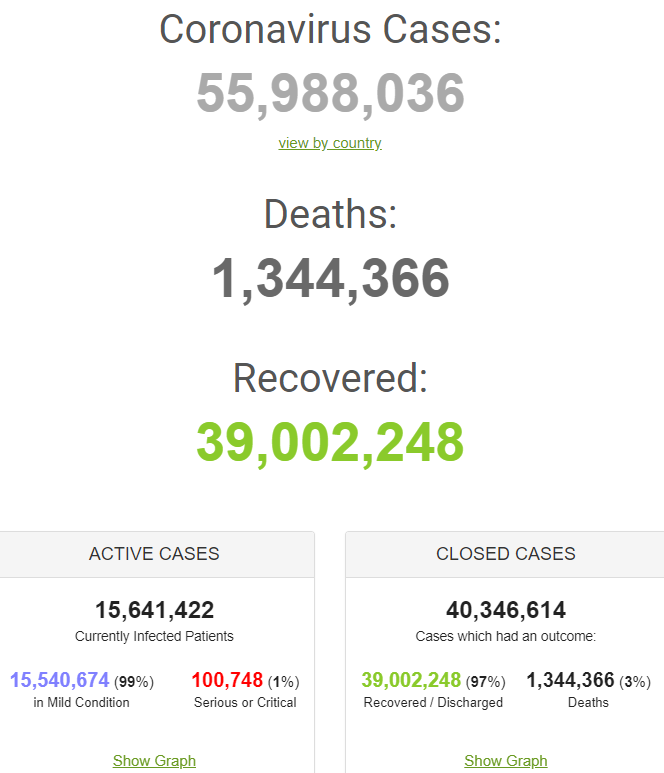
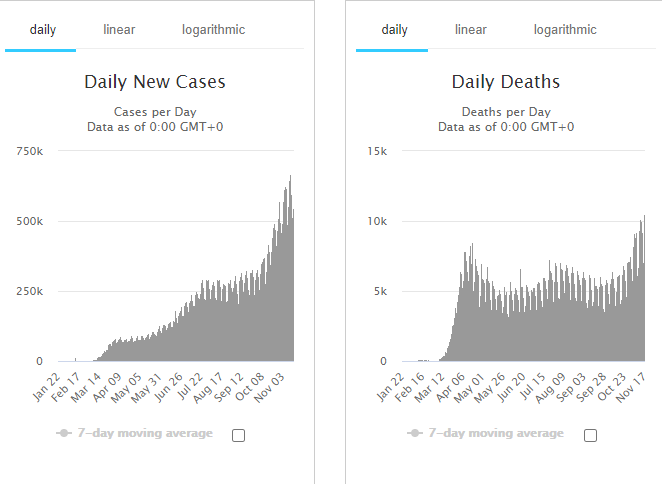
|
Country, |
Total |
New |
Total |
|
World |
55,934,704 |
+546,658 |
1,342,942 |
|
11,695,711 |
+157,261 |
254,255 |
|
|
8,912,704 |
+38,532 |
131,031 |
|
|
5,911,758 |
+35,018 |
166,743 |
|
|
2,036,755 |
+14,524 |
46,273 |
|
|
1,971,013 |
+22,410 |
33,931 |
|
|
1,535,058 |
+13,159 |
41,688 |
|
|
1,410,732 |
+20,051 |
52,745 |
|
|
1,329,005 |
+10,621 |
36,106 |
|
|
1,238,072 |
+32,191 |
46,464 |
|
|
1,211,128 |
+5,911 |
34,381 |
|
|
1,009,396 |
+2,874 |
98,861 |
|
|
939,931 |
+1,663 |
35,317 |
|
|
833,732 |
+16,206 |
13,248 |
|
|
788,473 |
+13,352 |
42,461 |
|
|
754,256 |
+1,987 |
20,432 |
|
|
752,940 |
+19,152 |
10,848 |
|
|
557,657 |
+11,968 |
9,856 |
|
|
537,871 |
+1,932 |
14,616 |
|
|
533,610 |
+1,006 |
14,883 |
|
|
524,503 |
+2,961 |
11,752 |
|
|
474,455 |
+3,807 |
15,393 |
|
|
469,769 |
+4,246 |
6,558 |
|
|
457,003 |
+4,302 |
8,616 |
|
|
436,684 |
+2,212 |
6,254 |
|
|
421,413 |
+3,819 |
11,704 |
|
|
410,714 |
+1,144 |
7,862 |
|
|
373,474 |
+8,262 |
9,261 |
|
|
361,082 |
+2,050 |
7,193 |
|
|
353,918 |
+362 |
5,692 |
|
|
325,537 |
+782 |
2,736 |
|
|
306,468 |
+4,276 |
11,086 |
|
|
301,604 |
+5,415 |
4,932 |
|
|
230,124 |
+4,452 |
3,553 |
|
|
214,597 |
+5,984 |
1,945 |
|
|
211,475 |
+502 |
1,247 |
|
|
181,104 |
+428 |
13,025 |
|
|
155,993 |
+6,454 |
1,909 |
|
|
152,809 |
+1,255 |
538 |
|
|
152,659 |
+5,203 |
3,281 |
|
|
148,721 |
+1,054 |
2,893 |
|
|
143,371 |
+125 |
8,859 |
|
|
137,885 |
+556 |
848 |
|
|
136,222 |
+194 |
235 |
|
|
Dominican |
134,697 |
+494 |
2,290 |
|
125,590 |
+998 |
1,578 |
|
|
121,653 |
+602 |
1,899 |
|
|
119,326 |
+1,190 |
1,903 |
|
|
118,870 |
+984 |
1,811 |
|
|
116,699 |
+1,251 |
1,060 |
|
|
115,730 |
+698 |
3,947 |
|
|
111,284 |
+275 |
6,481 |
|
|
107,953 |
+1,507 |
839 |
|
|
106,598 |
+4,828 |
2,413 |
|
|
103,395 |
+339 |
1,588 |
|
|
103,239 |
+137 |
2,839 |
|
|
98,050 |
+311 |
858 |
|
|
92,375 |
+4,994 |
1,054 |
|
|
90,912 |
+1,069 |
2,054 |
|
|
88,602 |
+1,326 |
557 |
|
|
87,464 |
+1,945 |
1,113 |
|
|
86,361 |
+15 |
4,634 |
|
|
85,952 |
+3,117 |
778 |
|
|
85,008 |
+126 |
337 |
|
|
81,723 |
+720 |
2,445 |
|
|
79,158 |
+2,075 |
1,005 |
|
|
78,825 |
+2,422 |
1,228 |
|
|
74,936 |
+612 |
1,041 |
|
|
72,857 |
+758 |
1,613 |
|
|
71,730 |
+1,569 |
1,625 |
|
|
71,729 |
+925 |
1,302 |
|
|
70,581 |
+282 |
598 |
|
|
69,591 |
+1,002 |
2,186 |
|
|
68,686 |
+330 |
1,995 |
|
|
67,469 |
+486 |
1,207 |
|
|
65,457 |
+152 |
1,163 |
|
|
64,935 |
+1,068 |
580 |
|
|
64,551 |
+1,220 |
768 |
|
|
58,130 |
+6 |
28 |
|
|
56,937 |
+1,393 |
876 |
|
|
49,730 |
+1,210 |
318 |
|
|
48,613 |
+977 |
1,376 |
|
|
36,876 |
+966 |
299 |
|
|
30,114 |
+600 |
298 |
|
|
29,126 |
+694 |
637 |
|
|
28,998 |
+229 |
494 |
|
|
28,392 |
+619 |
405 |
|
|
27,760 |
+10 |
907 |
|
|
27,681 |
+425 |
240 |
|
|
22,896 |
+204 |
433 |
|
|
21,004 |
+16 |
129 |
|
|
19,647 |
+228 |
371 |
|
|
7,513 |
+228 |
40 |
|
|
5,278 |
+3 |
116 |
|
|
4,676 |
+8 |
44 |
|
|
3,878 |
+3 |
60 |
|
|
1,288 |
+5 |
35 |
Retrieved from: https://www.worldometers.info/coronavirus/
From CNN’s Jen Christensen
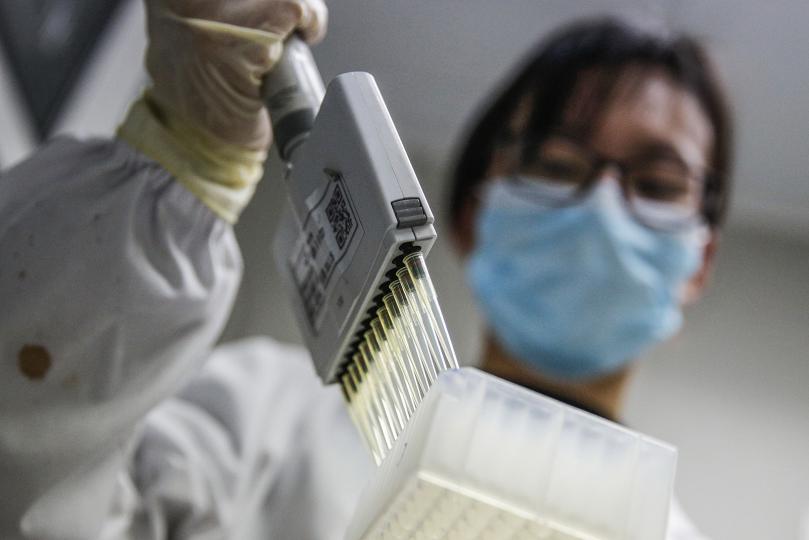
A staff member tests samples of inactivated Covid-19 vaccine at a Sinovac Biotech lab in Beijing on March 16. Zhang Yuwei/Xinhua via Getty Images
A mid-stage trial shows that a Chinese made Covid-19 vaccine seems to be safe, according to a study published in the Lancet Infectious Diseases Tuesday.
Sinovac, the Chinese company that makes the Coronavac vaccine candidate, tested it in a randomized controlled trial involving 700 healthy adult volunteers between April and May. None of the volunteers had a history of a Covid-19 infection. None had traveled in areas with a high rate of the disease.
Volunteers in the Phase 2 trial were divided into three groups. One group got a low dose of the vaccine, another got a higher dose and a third received a placebo.
This particular vaccine uses a chemically inactivated whole virus based on a sample taken from a patient in China. Most of the other coronavirus vaccines in development use biotechnology approaches to produce just a fragment of the virus. Using a whole, killed virus is an older, tried and true method that makes vaccine production slower and that doctors say can produce more side-effects.
The results: The vaccine was well tolerated at all the dose levels, and there didn’t seem to be any safety concerns, according to the researchers, which include experts from the Jiangsu Provincial Center for Disease Control and Prevention, China's National Institutes for Food and Drug Control, and Sinovac.
The most common complaint was pain at the injection site. One volunteer in the high dose group had a severe allergic reaction within 48 hours of the first dose, which researchers said may be related to the vaccine, but the volunteer was treated for the reaction and recovered within three days. The same volunteer did not have a similar allergic reaction to the second shot.
Even at the lowest dose, volunteers who received the vaccine seemed to show a robust antibody response within 14 days of the second of two injections. The injections were given 14 days apart.
What about efficacy? The levels of antibodies produced by vaccination were lower than in the volunteers who were infected by, and had recovered from, Covid-19 during the trial, but the researchers said they still expected it could provide protection. The study wasn’t designed to determine how effective it was.
There may be advantages to this vaccine, according to one researcher who worked at the company that made it. This vaccine only needs standard refrigeration. It also may remain stable for up to three years in storage.
The company is continuing its trials to determine how effective the vaccine is.
From Pierre Bairin in Paris
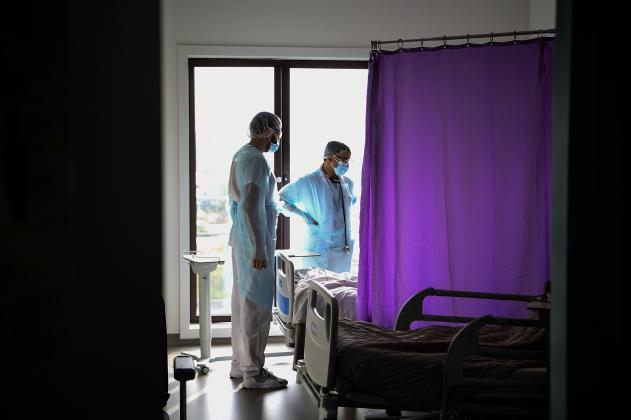
A doctor speaks with a patient infected with Covid-19 in the infectious diseases unit of the Gonesse hospital in Gonesse, north of Paris, on October 22. Christophe Archambault/AFP/Getty Images
France has become the first country in Europe to top 2 million confirmed cases of coronavirus, according to data from Johns Hopkins University and the French national health agency.
In a statement on Tuesday evening, France's health agency director Jerome Salomon confirmed at least 2,036,755 total cases had been reported in the country.
“Whether in cities or in rural areas, all regions, all metropolitan departments, are affected,” Salomon said.
“This second wave, which we are all facing, is massive, deadly and is straining all of our caregivers and our health system as a whole.”
While France has now registered the highest cumulative number of Covid-19 cases in Europe overall, Salomon noted that the current coronavirus reproduction rate in the country is now below one, while the daily number of new cases has declined in the past week.
“In recent days, the number of new cases has declined, redoubling efforts to regain control of the epidemic,” Salomon said, adding that public adherence to national coronavirus restrictions is now “beginning to bear fruit” in France.
“All collective efforts, respect for curfews and national confinement measures serve to explain this positive trend. It is by maintaining a very high level of vigilance and mobilization that we will be able to spend the end-of-year celebrations and the winter months in the safest conditions,” he added.
According to the latest data from the national health agency, a total of 33,139 coronavirus patients are currently in hospital -- down by 327 since Monday -- with 4,838 of those in intensive care.
A further 1,219 coronavirus patients have died since Monday, the national health agency added, bringing the total death toll in France to 46,273.
Retrieved from: https://edition.cnn.com/world/live-news/coronavirus-pandemic-11-18-20-intl/index.html
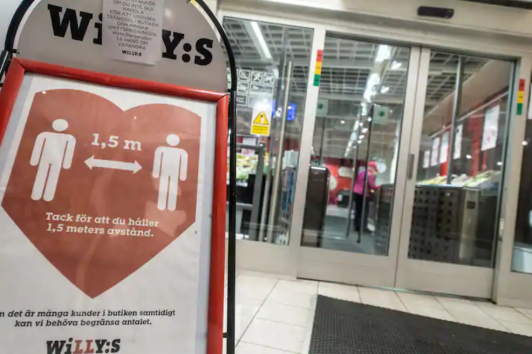
A sign reminding customers about social distancing in Stockholm on Nov. 16. (Amir Nabizadeh/TT New Agency/Reuters)
Even Sweden appears to be abandoning the Swedish model. On Monday, the country’s authorities banned gatherings of more than eight people as they grappled with the second coronavirus wave surging through much of Europe. The new restrictions followed other protocols coming into effect this week, including protective measures around nursing homes and bans on alcohol sales at restaurants and bars after 10 p.m.
The shift in tone is noteworthy given Sweden’s notorious light-touch approach to the pandemic. “It is a clear and sharp signal to every person in our country as to what applies in the future,” Prime Minister Stefan Lofven said during a news conference Monday. “Don’t go to the gym, don’t go the library, don’t have dinner out, don’t have parties — cancel!”
Sweden had set itself apart from its Nordic neighbors in its laissez-faire policies, joining only autocratic Belarus as the two European nations that eschewed major coronavirus lockdowns when the continent was hit by the first wave. The country’s nursing homes were ravaged by the virus, but life went on largely as usual in much of the rest of the country: Most schools and business remained open, while Swedish health authorities have even counseled against the widespread wearing of masks.
While right-wing politicians in the United States hailed the “Swedish model,” Swedish officials insisted their methods might not be replicable elsewhere. In an interview with Today’s WorldView earlier this year, Karin Ulrika Olofsdotter, the Swedish ambassador in Washington, stressed that widespread trust in the country’s public agencies meant that most Swedes would voluntarily heed social distancing guidelines. Sweden’s robust social safety net and enhanced paid sick leave, she argued, would help ensure more Swedes would stay home if they felt symptoms or feared contracting the virus at their workplaces.
“The virus is going to be around for a long time, so we have to have something we can live with,” Olofsdotter said then, adding that the country could change course if its approach were proven to be ineffective.
That moment may now have arrived. On Friday, Sweden recorded almost 6,000 new daily coronavirus cases. The total number of infections is nearing 200,000 in a country of 10 million people. In Stockholm, the capital, 1 in 5 people are testing positive, and the official number of positive cases could be much higher with more widespread testing. Hospitalizations are rising faster in Sweden than any other European country, and Sweden’s per capita death rate is several times higher than those of its Nordic neighbors Finland, Denmark and Norway.
Retrieved from: https://www.washingtonpost.com/world/2020/11/18/sweden-coronavirus-surge-policy/
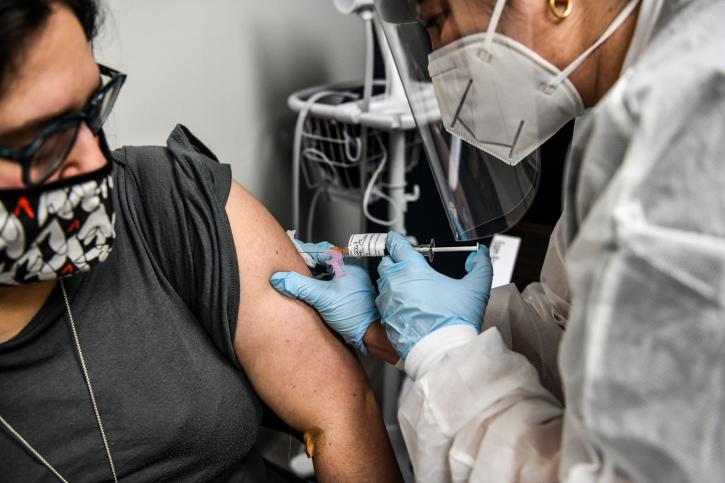
Heather Lieberman, 28, was vaccinated in Hollywood, Fla., in August. Americans are now more willing to get a vaccine for the coronavirus
In a sign that Americans are becoming less hesitant to take a coronavirus vaccine, a Gallup poll released on Tuesday showed that 58 percent of the adults who were surveyed were willing to be vaccinated, up from 50 percent in September.
The survey was conducted between Oct. 19 and Nov. 1, as coronavirus cases were surging across the country but before Pfizer and Moderna announced that their vaccines were 90 percent effective or better against the virus in late-stage trials.
Still, the results were promising for an eventual vaccine rollout, as widespread inoculation against the virus is seen as essential before restrictions can be lifted and life can return to normal, or something close to it.
Phoebe Danziger, a pediatrician at the University of Michigan who writes about medicine, ethics and culture, said in an interview that the Gallup data was consistent with what she had observed anecdotally.
“Clearly there’s a lot of hesitation out there, but it seems like there’s a slight shift into a positive view,” she said. As cases continue to rise across the Midwest, she senses that people across the political spectrum are starting to see that they are “really going to need this to get out of this mess.”
A rushed approval process for a vaccine was a concern for 37 percent of the adults Gallup polled, while 26 percent said they would wait for confirmation that a vaccine was safe. A smaller group — 12 percent — said that they did not trust vaccines in general, reflectinga mistrust of vaccines that has been on the rise across the country in recent years, stemming from the legacy of government experimentation on African-Americans and the disadvantaged as well as distrust of the pharmaceutical industry.
By Lorenzo Tondo
Italy on Tuesday registered a record of 731 deaths from Covid in the last 24 hours, its highest daily death toll since the beginning of the second wave of the pandemic. Such numbers had not been seen since 3 April, when the country was still in lockdown.
Over the past day, 32.191 have tested positive for Covid-19, the health ministry said and there are now 120 more patients in intensive care, bringing the current total to 3,612.
The second wave of the coronavirus has already claimed 9,000 lives in Italy, as the country’s alternative approach to a nationwide lockdown, has had little apparent success so far, with total infections passing the million mark last week and cases rising at more than 30,000 a day.
Leading Italian physician Andrea Crisanti said Tuesday that, rather than easing the current Coid-19 restrictions, the government may have to make them tougher.
“Next week we’ll know if the (contagion) curve has stabilized or has started to come down,” Crisanti told Italy’s news agency ANSA, the director of microbiology and virology at the University of Padua. “If it does not come down, it will be necessary to do something else.
“The social and emotional price is immense - 9,000 people have died since the start of the second wave, we must not forget that”.
On Tuesday, ICU doctors said the strain on intensive care units (ICUs) during this second wave is almost unbearable in high-risk red zones. Antonio Giarratano, head of the ICU doctors association SIAARTI, told Rai Tre that “it has been stated that the pressure on intensive care is sustainable but in fact, in the red regions the pressure is almost unsustainable, and in the orange ones it is very, very heavy”.
The Covid-19 outbreak during the second wave and the associated containment measures have pushed Italy’s economy into a deep contraction. Italian retailers association Confcommercio said Tuesday that consumer spending plunged again in October, dropping 8.1% compared to the same month in 2019. Tourism-linked businesses were hardest hit, with ‘’recreation services down 73.2%, hotels down 60% and bars and restaurants down 38%.’’
· The US medical establishment has urged Donald Trump to share crucial data with the president-elect, Joe Biden, in order to save lives and prevent the country’s healthcare system from being overwhelmed.
· Several US states including Iowa have backtracked on earlier policies and recommended that people wear masks as cases in the US continue to spread. Senator Chuck Grassley, at 87 the oldest member of the US upper house, has become the latest high-profile figure in Washington to test positive.
· Almost half the headtechers in England are considering quitting after the virus is brought under control, according to a union survey. It comes as 598 more people died on Tuesday within 28 days of testing positive for Covid 19, bringing the UK total to 52,745. This represents the highest daily increase since 12 May.
· Businesses in Tokyo could be asked to shorten opening hours in order to contain a worsening outbreak of the virus that has seen cases in the Japanese capital reach a record daily high of 472 on Wednesday.
· Turkey is imposing fresh restrictions in the wake of a sharp rise in cases. Restaurants and cafes will be asked to close at 5pm from Friday, and a parital lockdown will be imposed on the country at weekends.
· British Airways is to launch a voluntary coronavirus test for passengers travelling to the UK from three American airports. The airline said it will trial a testing regime, which will involve hundreds of travellers on particular routes from the US to Heathrow.
· South Australia has imposed a six-day “circuit-breaker” lockdown to beat an outbreak of cases in the state’s capital, Adelaide. Most schools will be closed, as will universities, pubs, cafes and food courts.